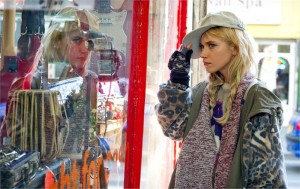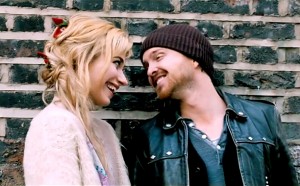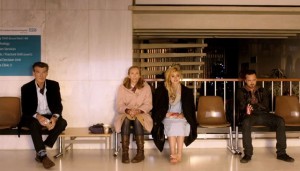
Suicide is no laughing matter, but we try.
If it’s not a heavy drama or inspirational story telling you to stop and watch the sunset, stop and smell the roses and the like, making a film about suicide requires a light touch and buckets of understanding and sensitivity.
As a comedy plot, it only seems to work when sensitivity is disposed of completely. Suicide has been a successful plot for dark comedies, most notably Heathers and Harold and Maude, which are full of irony, satire, insight and meditation.
But A Long Way Down, a British film based on the bestselling novel by Nick Hornby, author of About a Boy and High Fidelity, is not a dark comedy (through its Wikipedia page suggests otherwise). Instead, it’s a light comedy that wears its life-changing intentions on its sleeve and comes across too obvious to be genuine.

The film follows four people of varying ages who meet when they all try to commit suicide on New Year’s Eve. The first we meet is Martin Sharp (Pierce Brosnan), a disgraced talk show host jailed for a liaison with a 15-year-old girl (ridiculously he claims she looked 25). As his relationships with his wife and child were ruined by the scandal and he has becomes widely hated and unemployable, he plans to throw himself off a building. At the top, he meets Jess (Imogen Poots), Maureen (Toni Collette), and JJ (Aaron Paul), who had the same idea.
Politician’s daughter and club kid Jess impulsively decides to jump after being dumped by Chaz, a character so unnecessary that after one early scene, he is never mentioned again. Maureen is an anxious, religious woman existing in a world she considers crass (as exemplified by Jess), who refuses to engage with pop culture or create a life for herself outside of caring for her son. Her grown son, Matty, has severe cerebral palsy and requires constant care. Rounding out the group, JJ is a pizza delivery boy and washed-up musician who tells the group he has brain cancer so they’ll take him seriously.
Decisions in the film seem less guided by character or logic than by a map of where the plot should go to hit from point A to B. In a chain of events that would never happen in real life, the group bizarrely form a makeshift family and convince each other to stay alive until Valentine’s Day. In quick, fragmented episodes, they become the target of a media frenzy, go on a beach holiday together to escape and return to London, where hardly anything happens until the film ends and everyone’s fine. In the midst, there’s an intriguing story suggested, as the foursome inspires others to reconsider their plans for suicide by lying to the press and saying they were stopped by an angel, but the thread is quickly dropped and never returned to.
Director Pascal Chaumeil has produced a film that’s pretty to look at, and tries to be aspirational and life-changing, but ends up more being more offensive than anything else. It’s particularly irritating when a film with such sloppy storytelling and such a gross inability to create characters that feel like flesh and blood (instead of quip generators) is used in such a manipulative manner to try force an epiphany in its viewers. It’s possible A Long Way Down has good intentions; it certainly has a positive message, but it doesn’t feel like the filmmakers really put their hearts into it. The film has a lot of good points, for the most part–it’s funny and enjoyable, it hosts several capable performances, and is glossy and fluffy enough to feel like a quality picture. But it’s completely tone deaf.

The story aimlessly moves between characters, whiplashing from corny moments of the group splashing around in the ocean together to close-ups of the characters looking off sadly into the distance with little coherence. By the end, it’s suggested that suicidal depression can be completely overcome by a tropical vacation, goofing off and forming a wacky inter-generational friendships. Harold and Maude seems to be successful version of what the film is aiming for: an unlikely connection between two people that a gives a young person a new lease on life.
The problem with portraying a complex issue like depression in a film is that it makes it difficult to create characters that feel universally “likable,” an oft-cited necessity for a successful film. A viewer with no sympathy or personal experience is liable to find characters with clear mental health problems like Jess and JJ irritating and self-indulgent for complaining about their lack of what others might consider real problems. The film tries to counter this possibility with first person narrative, a tactic that allows the viewer a look into the characters’ heads; however, these narrations provide little else besides an opportunity to include some witty, classically Hornby lines cherry-picked from his book.
In addition, the film refuses to take Jess’s depression seriously. She clearly has some mental health issues, as she wishes she were invisible, appears slightly sociopathic and unable to relate to other people and filter out inappropriate speech, and even stalks a boyfriend to the point where he fears for his life. Add to this her severe alienation from her parents and her missing sister, the golden child, and she comes off as the most developed, relatable character. Still, her problems are played down and attributed to her merely being a dramatic teenager. It’s the same tendency we’ve seem in other media, to regard any problems felt by a privileged young woman as “first world” or “rich white girl problems.” Instead of showing us that Jess does have mental health problems despite her privileged background, she’s portrayed as a poor little rich girl who makes problems for herself.

There is also a desire between the characters to give one specific reason for their suicidal intentions and for the most part it’s very easy for them to do. Martin has his blighted reputation, Maureen has the burden of caring for Matty, and Jess, because Chaz doesn’t love her. The lone exception is JJ and much his arc through the film centers around the lie he tells the others to get them to take him seriously (that he has cancer) and the accompanying depression of not having a reason for being depressed. In the last act, the other characters finally take him seriously when he goes back to the tower roof to commit suicide but any meaningful character development or recovery is overshadowed in favor of an ill-thought-out romantic relationship with Jess. The relationship comes out of nowhere towards the film’s end (they do not get together in the book), suggesting the filmmakers couldn’t imagine a platonic relationship between young attractive male and female characters, even when they appear to emotionally vulnerable for a serious relationship.
However, real-life people are more complex than that and there are often many reasons why someone might consider suicide, as well as biological and social factors, such as what support system they have in place. It is rare that it can be so easily reduced to a sentence. Rather than portray the characters as learning they are being reductive, even with JJ’s second suicide attempt, the film itself produces characters who can be easily reduced to types (Martin is slimy, Jess is manic, Maureen is restrained and JJ is a would-be rocker) and scarcely gives us any reason to see them in three dimensions. The characters’ back stories are so glossed over and devoid of context, that it’s unclear what is motivating them most of the time. For example, there is no explanation of why Martin’s children do not factor into his decision to commit suicide or why Maureen does not have the support of her family, any friends or of Matty’s father.
By the ending, on New Year’s Eve of the next year, everyone seems fixed. They still talk, but less like a support group helping each other stay afloat than four people that can barely remember why they felt so hopeless a year ago. Like I said, maybe that message has moved some viewers. It’s true that Depression is like that. You find yourself so desperate you can’t imagine living a second longer and then one day, much later, you look back and feel like a different person.
But A Long Way Down promises an unequivocally happy movie ending. These people are capital F- fixed, they’ve been in the trenches together, but they’ll never be up on the ledge again. There’s no reason to keep worrying about them or an acknowledgement of the reality that depression is a mental illness that can recur again and again. Though Jess and JJ mention being in therapy, which suggests their mental upkeep is a constant process, it doesn’t seem as important to them as the happily ever after of their romance.

Likewise, Martin and Maureen’s stories are played as if they’re cured. Sadly for character development, the resolutions for both their stories take place off-screen and are never detailed. Though Martin’s reputation and job prospects are forever destroyed and people call him a pervert in the street, all is well when he gives up worrying about everything else to spend time with his kids.
Through grotesquely underdeveloped, Maureen appears to be a fascinating character, with a life we rarely see onscreen. She is raising a special needs son alone, worried about his future and burdened by the responsibility, all of which make her a complex character with an intriguing story of her own stuffed into a meandering flick where she is allowed little onscreen development.
From what we see, her life magically sorts itself out though Maureen’s routine barely changes. She saves Matty from a possibly fatal heart attack and realizes her son needs her, but of course, the burden of being his sole carer was the main reason she felt suicidal to begin with. Other than that, all she needed to fix her life was to join a quiz team and get a boyfriend.
In my opinion, A Long Way Down could have been a satisfying film. Framing it as a serious and subtly meaningful film, with black comedy to lighten the mood, could have saved it.
The core premise, of a bunch of strangers coming together, and helping each other have a better future is fairly classic and has proven itself to be a creatively fruitful jumping off point in the past. But it’s not handled capably here.

Still, I could be reading the whole thing wrong. Maybe approaching suicide with a feather-light touch has made the story more accessible and even cheered some honestly depressed real-life people. It’s possible to see how it could be moving or even inspiring that everyone gets a happy ending. But I’m a cynical person, I like my comedies dark, so A Long Way Down isn’t for me. But maybe it can help you.
_______________________________________________________________________________
Elizabeth Kiy is a Canadian writer and journalist living in Toronto, Ontario.
